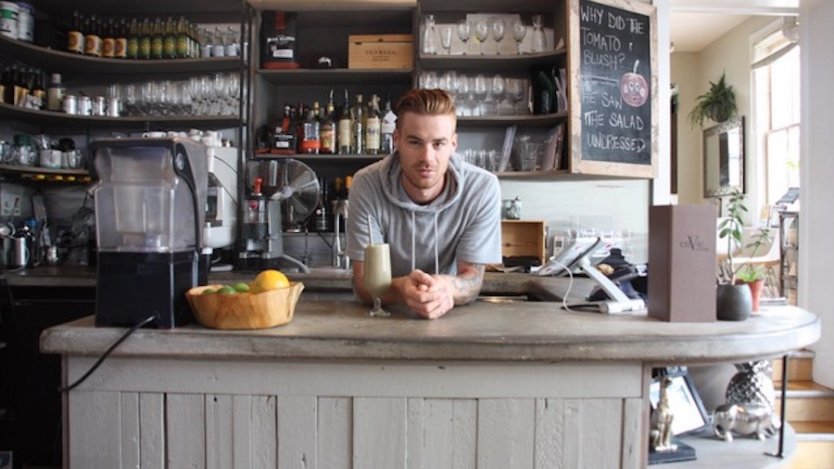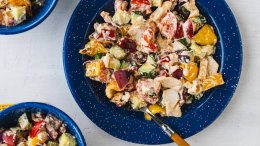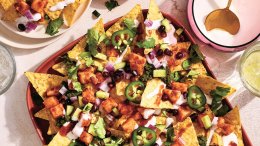If I say “Nova Scotia food”, and you visualize licking donair sauce off your fingers at Pizza Corner at 3 o’clock in the morning, then you can call yourself an honorary Haligonian. And if you’ve sampled a pan-fried haddock dinner, fish n’ chips or a lobster supper from any of the hundreds of mom n’ pop diners across the province, then call yourself lucky.
But things have changed. New chefs and independent entrepreneurs have caused a gastronomic swell in Nova Scotia, as small restaurants with big ideas swipe away the tartan tablecloth to reveal bar stools and charcuterie boards, fresh farm-to-table ingredients, European influence and Asian flair.
How has the Nova Scotia food scene evolved over the past few years, and where will it go next? Here are some answers from local experts from The Flying Apron Inn and Cookery, Studio East, Ratinaud and The Kitchen Table, EnVie, The Vegan Kitchen and an independent food writer.
Chef Chris Velden, The Flying Apron Inn and Cookery, Summerville
Ten years ago, this whole farm to table, and involving farmers in your approach, had just started. Coming from Vancouver (the West Coast is always ahead of the East Coast), it was something, like: “Oh OK, we’ve been doing this for a while now,” and for me coming from Germany, that’s what I did all my life, so in the last 10 years, that has been picked up here and that’s been really great. Doing the local thing, that also brought a shift in what people were doing, what people produced. There was more focus on talking to chefs and chefs talking to farmers.
When you look at the history of Nova Scotia 50 to 60 years ago, Nova Scotians could feed themselves... There’s a whole generation of new chefs in Nova Scotia, they are going that route, producing themselves, making charcuterie, involving more farmers, having a real close relationship with the producers, and I think that will get more intense. Also, simpler cooking styles, like making honest food; making the real good stuff, involving Nova Scotia history, using Nova Scotia recipes, the Acadian influence…
Laura Oakley, food writer
When I started writing seven years ago, the local food movement was already on its way because there was a handful of chefs (Craig Flynn, Geir Simensen, Michael Howell) that were pushing it forward in the province. I think people were intimidated by it, but bigger chains have listened and they know that in Nova Scotia, people want to see local products supported. You look at the tap list at Jack Astor’s and it has a bunch of N.S. craft beer on it now.
The breweries just continue to open at a crazy rate. The cideries now are continuing to open and they are taking up a lot more market share in the Nova Scotia Liquor Corporation stores. I think you’ll keep seeing more and more local products on menus, and that the standards will go even higher. Back in the day, if you were a chef, you only had a couple of producers to choose from and you kind of took what you could get, and now, there are so many, that it’s raising the bar even higher.
Saronn Pov, co-owner, Studio East
We left Halifax in 2010. When we came back in September 2013, we noticed a big difference. The popularity of ethnic food continues to grow, specifically Asian, Indian. Ethnic food has become a staple, like your pasta, your comfort food, so it’s in everyone’s kitchen and everyone’s going out and craving it. People here are ready and are hungry for that. Now, even the grocery stores have more offerings of ethnic foods and ingredients. When you see Walmart offering guava and all this tropical stuff, you know there’s something happening.
I think our knowledge of nutrient-based foods will increase. People want to feel better, look good. That’s why you’ll start hearing about fermentation a lot. Four years ago, people were afraid to put the word “fermentation” on the menu. It’s not just based purely on the pleasure of consumption, it has health benefits. When you see kimchi on our menu, when you see fermented ribs on our menu, our fermented slaw, fermented sausage—people embrace it now. You will continue to see fermented foods in everything. It’s going to be normal.
Sustainability isn’t just about the food. I won’t say too much more about it because I don’t want to scare anybody, but it is a neglect in the industry that we are not taking care of our cooks. We don’t know any other industry that is pushing the most important people to the bottom until they quit. I don’t want to continue the problem. I want something changed. Everyone is scared of change. You can’t have a restaurant community without quality in the work-life balance of the staff, especially the cook. It’s something that we forget. Food is people.
Frédéric Tandy, owner Ratinaud and The Kitchen Table
Well, it evolved from being something terrible to becoming decent! When I first moved to Halifax in 2002, what I mostly saw was big brand names, but there weren’t very many independently-owned restaurants. I remember going to some restaurants and the ambience was always nice and it was really nice and clean, but when it came to service and food, it was very mediocre, and we were paying a prime price for it. We have clients who come in the restaurant and they say, “You know I haven’t been in Halifax in five years but things have really changed, food-wise,” and that’s true.
It seems like in Nova Scotia, things are becoming more creative, using more ingredients that people don’t necessarily know or wouldn’t think about eating. For example, at the restaurant, we serve moss. Some people have a bit of an issue to eating some things. We had sweetbread on the menu last week, and people were like, “We can’t have that.” It’s actually a product that is considered delicacy in Europe and people are really excited to eat it, but not so much here.
The food industry is evolving in the city because it’s mostly people from away who bring their culture to the city and want to share it with people. So this is definitely evolving in the right direction and I think it’s going to get better and better.
Cory Urquhart co-owner, operator of EnVie, A Vegan Kitchen
It’s been awesome, especially in our little corner of the North End. I think people are open to a lot more things. There are a lot more options for healthy eating. Compared to three or four years ago, it’s a lot different. There are a lot more options and it seems like there are more people excited to go out. There’s a big city vibe and different experiences and different atmospheres depending on where you go in the city.
We did surveys a couple of years ago, and it was something like 75 to 80 per cent of the people who come aren’t vegan or vegetarian. We would never survive if we just had vegan or vegetarian people come in. The city’s just not at that point. Unfortunately, I don’t think the world is quite at that point.













